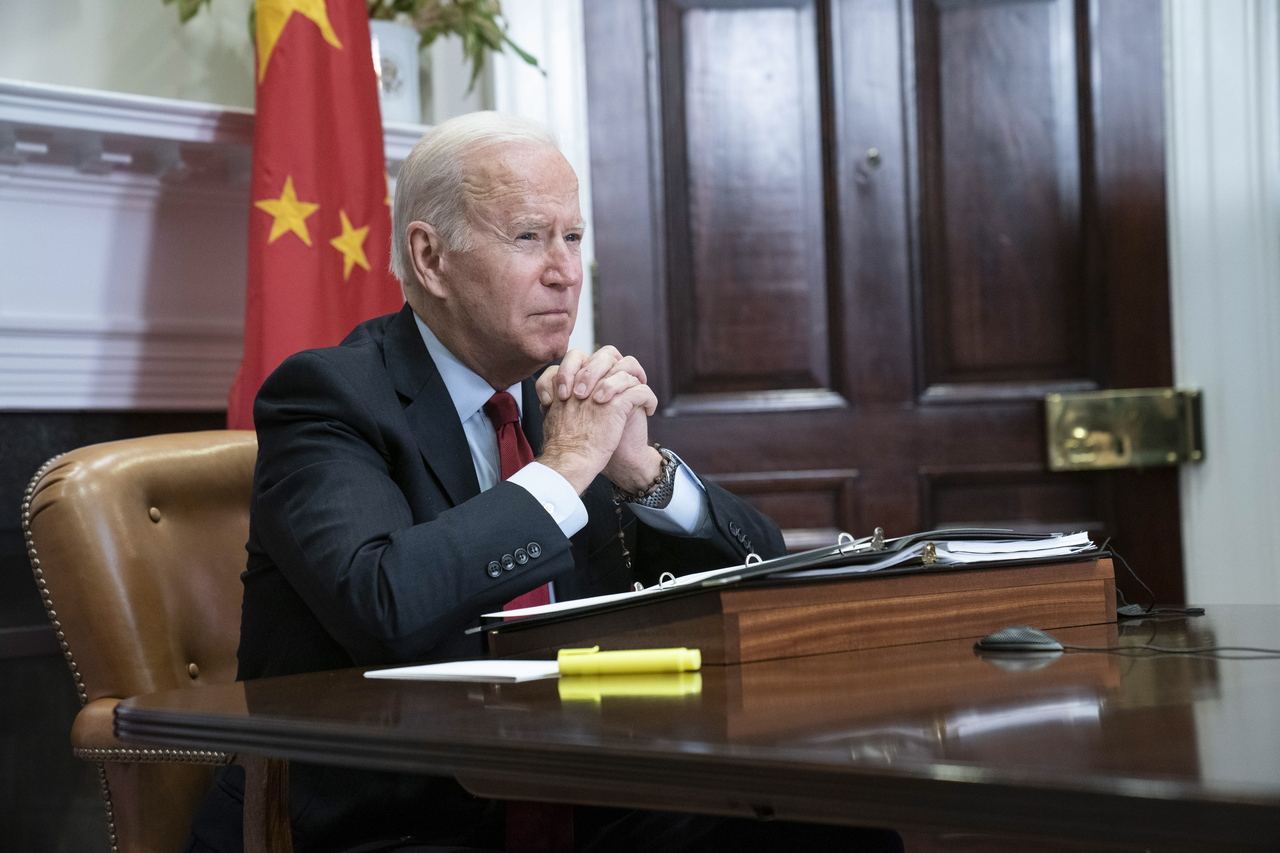Biden's Taiwan gaffes risk real-world consequences with China
Sign up now: Get insights on Asia's fast-moving developments

US President Joe Biden listening during a virtual summit with Chinese President Xi Jinping at the White House on Nov 15, 2021.
PHOTO: EPA-EFE
HONG KONG (BLOOMBERG) - When it comes to Taiwan - long seen as the issue most likely to drag the United States and China into war - every word matters. And lately US President Joe Biden has been flubbing his lines regularly.
After reassuring Chinese leader Xi Jinping that the US does not take a position on Taiwan's sovereignty in a Monday (Nov 15) virtual summit, Mr Biden one day later described the island as "independent" to reporters.
The President quickly walked back the comment, saying he was referring only to the democratically ruled island's need to make its own decisions, and not asserting its independence - China's oft-stated red line for an invasion.
It was at least the fourth time in as many months that Mr Biden or his aides needed to clarify a remark he had made on Taiwan, which Mr Xi's Communist Party claims even though it has never ruled the island.
The sensitivity around language regarding Taiwan reflects the tremendous stakes involved: Any real shift in policy risks sparking a conflict between two nuclear powers.
While Mr Xi's participation in this week's summit suggests the two sides are not about to slide into war, Mr Biden's loose talk undercuts his administration's diplomatic efforts. From trade talks to arms sales to visits by officials, Mr Biden's aides are preserving Washington's subtle shift under former president Donald Trump towards closer ties with Taipei, while bolstering the "one China" compromise that has underpinned ties with Beijing for more than four decades.
"If this were baseball, Biden would be out with three strikes, but this dangerous situation is more than a game," said Ms Shirley Kan, an independent specialist in Asian security affairs who previously worked for the US Congressional Research Service. "Biden fails to clarify our policy and leaves confusion instead."
The stakes are particularly high because Mr Biden faces a Chinese military that Taipei has warned will have the capacity to invade Taiwan by 2025. The People's Liberation Army has been increasingly demonstrating that capability with missile tests, fighter jet incursions and naval patrols intended to put political pressure on its China-critic president, Ms Tsai Ing-wen.
The Trump administration attempted in its final months to poke China with a dizzying series of overtures towards Taipei that left many wondering whether the US was abandoning the "strategic ambiguity" outlined in the Taiwan Relations Act of 1979. Mr Biden, who voted for that law as a senator, brought expectations for a more cautious approach.
To that end, the Biden administration has sought to firm up the "one China" policy, which acknowledges Beijing as the "sole legal government" of China and leaves Taiwan's status ambiguous, while clarifying the depth of US support for Taiwan. That has ranged from Secretary of State Antony Blinken advocating a greater role for Taipei at the United Nations last month to warning that American allies would "take action" if China used force against Taiwan. Mr Biden also affirmed the US' "Six Assurances" to Taiwan - a series of guarantees that China considers hostile - in his summit with Mr Xi.
'Playing with fire'
Even those moves have prompted hot rhetoric from Beijing, much of it likely designed for domestic consumption. Mr Xi warned in this week's meeting that those who support Taiwan's independence were "playing with fire", according to state media accounts. Foreign Ministry spokesman Zhao Lijian reiterated in a briefing on Wednesday that China considered the Six Assurances a "fabrication" and "illegal, null and void".
The Chinese Foreign Ministry's official readout of the summit, however, offered a more measured version of the exchange, stressing Mr Xi's "patience" and continued support for "peaceful reunification". The Chinese statements showed that Mr Xi did not view US actions thus far as breaching his bottom line against Taiwan's formal independence.
"The fundamental US policy towards Taiwan has not changed. There is no explicit policy shift," said Prof Margaret Lewis, a professor at Seton Hall University Law School and a visiting researcher in Taiwan. "But it's clear there was robust support under Trump, and that momentum has carried over into Biden; if anything, the sense is the momentum is increasing, not decreasing."
Mr Biden's struggle to articulate a position on Taiwan also complicates his efforts to manage China policy in Washington, where there have been calls for making support for Taipei even more explicit. Lawmakers have introduced legislation in recent months that would authorise military force to prevent a Chinese invasion and grant Taiwan a US$2 billion (S$2.7 billion) annual credit line to buy weapons - things not covered of the Taiwan Relations Act.
Ms Bonnie Glaser, director of the Asia Programme at the German Marshall Fund of the United States, said Mr Biden's statements have not consistently signalled an ironclad guarantee that the US would come to Taiwan's defence.
"Most of them have simply made no sense," Ms Glaser said. "These statements have sent confused signals and have not advanced American interests in preserving peace and stability in the Taiwan Strait."


